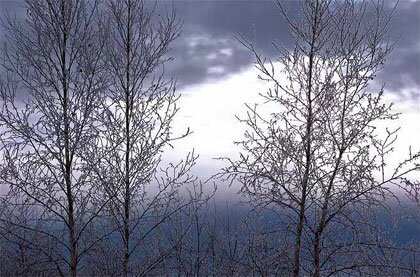Stand of Birch
Announcer: The recent ice storm, like all storms, brought down some things and not others. Commentator Philip Baruth woke to find that the ice had fallen heaviest on one of his birch trees — the smallest one, the one he’s always worried over most.

Notes from the New Vermont
Commentary #212: Stand of Birch
In August of 2001, after my wife, my three-year-old daughter and I had finished lugging all of our possessions into the house where we now live, we all sat on the front steps cooling off. It was hot, but a beautiful, moving-in-day sort of hot. We looked out over the lawn and we decided then and there that it was missing something crucial: birch trees.
So we immersed ourselves in birch trees for a week: river birch, weeping birch, European silver birch. But after all that, we finally went with the sort we’d both had in our yards growing up, white paper birch.
And at a tree nursery in out in Colchester we found just the pair we wanted, with an unexpected side benefit: a much smaller third tree growing right in next to one of the larger two. That small tree had a big gash at the base of its trunk, though, and the nursery owner said we could have it for free, but it probably wouldn’t last out the winter.
We loved it, though, and we took that grouping of trees home and planted them and then we stood there — our daughter Gwendolyn holding Annika’s hand, and Annika holding my hand — and the three of us looked at the three of them. It was an uncanny moment of recognition.
Annika and I exchanged a look, but neither of us said a word out loud, because we’re superstitious, and the little tree might not make it through the winter.
Still, I taped it up the best I could, and come spring the little birch seemed fine. By the end of August, the wound at its base was surrounded by a tough circular lip, and you could tell that the injured part was now as tough, if not tougher than any other part of the tree. My wife and I were happy to have the whole family of trees thriving, but still we didn’t say anything, not for almost seven years, because you really never know.
You never know, for instance, that an ice storm will single out one of your trees, and leave all the others alone.
Last week, that’s exactly what happened: we woke up to find everything sheathed in ice, the house, the car, the trees and bushes, everything glittering and silent and unharmed, except the smallest of the three birch. For some reason, it was overpowered with ice, lying almost horizontally along the ground, the branches reaching right up to the front door.
And I ran out and found that there was nothing I could do — no amount of knocking or scraping would shatter the ice. The only way to remove it was to cut the tree itself, which I couldn’t bring myself to do.
So for three days it lay almost broken before the door, and for three days we looked at it helplessly from the kitchen window. Finally the sun came, and the temperature rose a bit. Nothing to write home about, but enough to weaken the ice, and we were able to work the largest clusters of it away with our fingers.
Then, with a pair of pruning shears, we eventually cut its crown loose from the earth, and it took a day or two, but it slowly rose back up into the air. And suddenly there were three again, the father birch, the mother birch, and their paper-white child.
Only later that night, talking it over, did my wife and I admit out loud that we saw them that way, as ghostly images of ourselves. It’s not that we’re not superstitious anymore, because we are. It’s because we realized that superstition won’t keep your children safe. Only love, and a full lifetime of worry, can accomplish that.
[This piece aired first on Vermont Public Radio. Audio of the commentary is available here.]